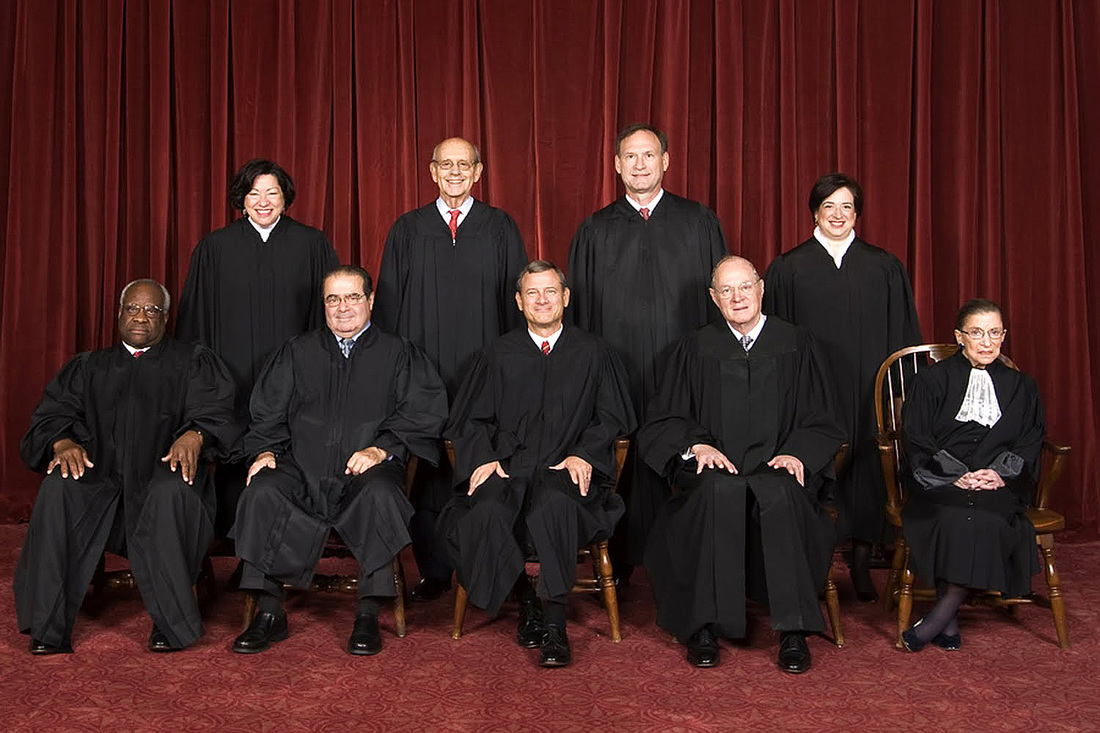In the meantime, the reaction was visceral whether on the streets or in social media. The supporters of marriage within the LGBT community were elated sporting the rainbow flag connoting gay pride. Detractors of the decision, including many in religious communities, were not so elated. I'm trying to be nice, here. Okay, in fact, those not in support were abusively horrid in their reactions against the government ruling. And, I have to admit, supporters of the decision may not have understood entirely what they were rooting for.
I actually think, unlike the dissenters, that the argument from the Equal Protection clause makes sense, or at least more sense, than the Due Process clause. I am not a constitutional scholar so I cannot speak to the relationship of these clauses to the other, but it seems that a fundamental right to life, liberty, and property has to be at stake only if marriage is a right. I do not think that it is, at least right now, though constitutionally speaking it is. Let's say it is, respecting the will of the citizens involved in seeking marrage, then the ruling makes sense if the government withholds from people the benefits granted by marriage. If a man chooses to marry a man or a woman (or vice versa) should not be the basis for government/State regulations or benefits related to marriage. Government cannot and should not discriminate by sex or gender. This is the trajectory where Kennedy should have gone instead of creating the notion of a right to marry.
As for the response from the Church to this ruling and its supporters, I am sorry. In my view, the Church is not the hierarchy of official leadership, celebrity figures of faith, or well-known pastors. The Church is the people of God. The people, the laity (Greek, laos), failed miserably this week in communicating grace in its context. This is where the title of this piece comes from. A cassock is an ankle length robe worn by church officials. At some point, Christians cannot hide behind official positions proffered by pulpiteers or ignore the people living in their neighborhoods or castigate loved ones in their families. The apostle's teaching to believers is clear: "[A]s God's chosen people, holy and dearly loved, clothe yourselves with compassion, kindness, humility, gentleness and patience." (Colossians 3:12, vv. 1-17 for context). I believe the cassock, the robes of the Church, now symbolize hatred, frustration, vile words, abusive language, and people more willing to react (REACT!!!) rather than respond graciously as those described by Paul as "God's chosen people." Christians have created their own negative stereotypes of themselves. I think Christians, including myself, are at a crossroads: Am I a citizen of my government, first, or a citizen of heaven? Many faithful believers think that to choose heaven means to reject the authority of government, a clear rejection of Paul's teachings in the letter to the Christians living in the shadow of the empire in Rome (chapter 13:1-10). As a political libertarian, I find this passage difficult to obey, but it is not my life but His that I emulate. We remain participants in this realm, faithfully believing and working toward righteousness inwardly and outwardly, but because of our heavenly citizenship, we have the responsibility to bring Christlike behavior into this realm (described in Colossians 3 and Romans 12). Lashing out at those that disagree with positions held by the Church does not accomplish this task. The apostle Paul in his letter to the Christians in Philippi makes it clear that mature Christians should "live up to what we have already attained" as those for whom our "citizenship is in heaven" (Philippians 3:15-21). As citizens of the heavenly Kingdom, our role as the faithful is to be Christ-like among those who are not yet or never to be like the Jesus we claim to follow. From what I have seen in social media this week, mostly on Facebook, we have failed. I ask you, and you know who you are, to publicly forgive those who you think have wronged you and repent of your malicious words by asking them to forgive you. For my part, please forgive me for any ill-bespoken word and accept my apologies. So what now?
1) As Christians, we need to begin working through distinctions between civil marriage and marriage in the church. Are they different? If so, how so? What can Americans learn from churches in places with similar governmental laws such as Canada, France or the Netherlands? What changes might be needed to church polity? I remember thinking how the discussion about civil unions during the late 1990s could have been a good middle way in navigating the increasingly pluralistic ideologies present in the United States. It was confirmed during our time in France in 2002-2003 when we attended a church wedding ceremony after the couple had been civilly united in the Mairie's (mayor's) office. Well, that opportunity is long gone. We need new thoughtful response for a new time. I am thinking of the suggestion by friend and pastor Kevin Angel that wondered how churches will need to not only think about how to recognize civil marriages but also how to recognize the dissolution of a marriage if it is a civil action. Kevin Dennis, a district superintendent in West Virginia, wrote this response to the Supreme Court ruling, anticipating challenges to church polity. 2) As Christians, we need to assess how we participate in social media. My rule of thumb: I only post or tweet what I'm willing to say loudly on a public street. If not, I keep my trap shut. 3) In a related vein, as Christians, we need to listen to ourselves in terms of the way we come across in public. Some of us are just plain mean, man. Chill. Out. If I as a Christian hold an opinion about same-sex marriage, I will state my opinion as if I am surrounded by those that disagree with me. And do so while maintaining a biblically sound and missionally sensitive Christian witness. This is why I liked Andy McGee's Facebook post in response to the SCOTUS decision on the group Love Wins.:LGBT. It's not dissimilar from the public statement issued by the Nazarene Board of General Superintendents. Some might say they are not taking a very strong stance or at least not a very clear stance. Exactly. A stance or position can quickly become defensive. An understanding of the situation and seeking a gracious response is fully missional. The way ahead might be uncertain, so let's take time to walk together into this future. 4) As Christians, we need to learn to respond rather than react to our social context. This is one reason that I was encouraged by Thomas Fletcher's thoughtful Facebook statement and the blog post at The Fletch Says on his support of same-sex marriage. You may not agree with it in part or at all but at least he has thought through the issues. There's not a reactive element here but a long process of struggling and wrestling with difficult questions. And, like anyone 25 year old, his thoughts are still in process, so be kind to him. It is what the Board of General Superintendents asked of Nazarenes in stating: "We further call our people to a generosity and graciousness of spirit that extends kindness to those who do not share our belief." That's what the apostle Paul meant by "speaking the truth in love" (Ephesians 4:15). 5) As Christians, I hope we are better than our collective rhetoric of the past week. The world needs us to be light (cf. Matthew 5:14). We do so by not slamming the door shut in people's faces. Let's come out from behind the cassock, and keep the conversations going. UPDATE: I just was pointed to this paper, "Wesleyans and Homosexuality" by the influential (and relatively conservative) Nazarene theologian J. Kenneth Grider published in 1999. I share it here without having read all 45 pages.
1 Comment
Leave a Reply. |
Bio
teacher, writer, Archives
August 2022
Categories
All
|




 RSS Feed
RSS Feed